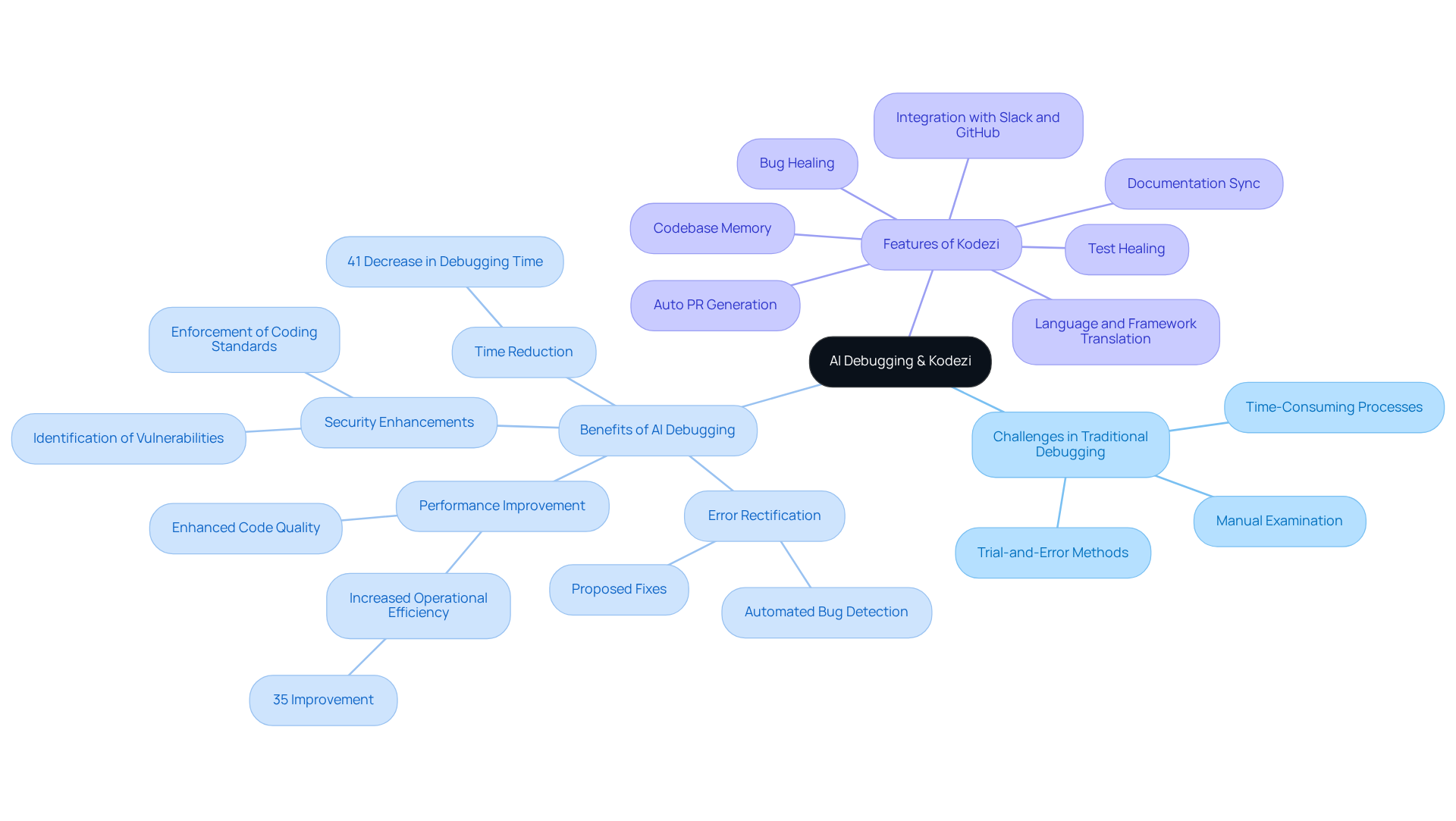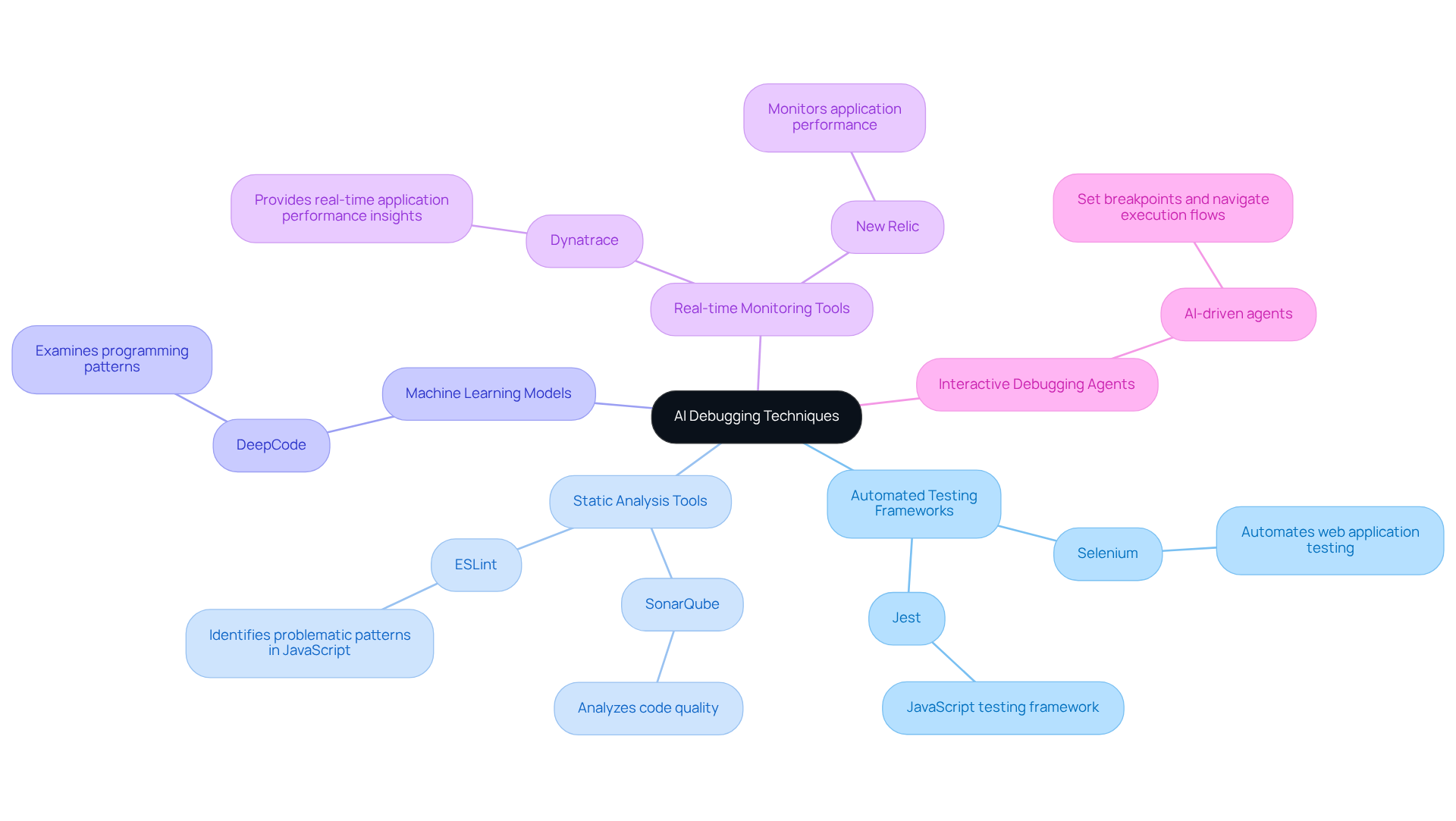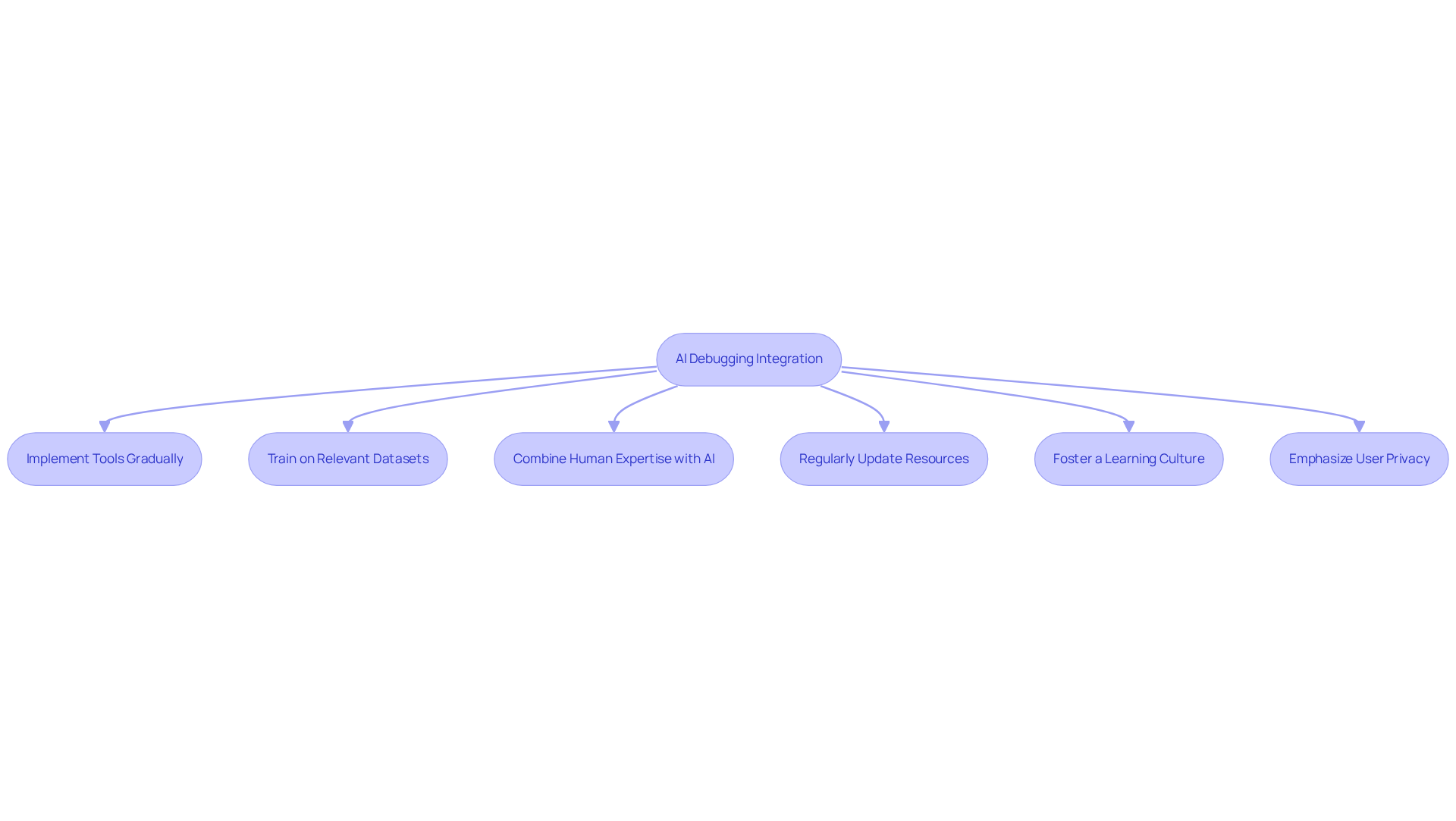Overview
Mastering AI debugging techniques is essential for enhancing efficiency in software development. Developers often face significant challenges when it comes to bug detection and resolution. How can they overcome these hurdles? Enter Kodezi, a tool that leverages machine learning to automate the debugging process. By significantly reducing debugging time, Kodezi allows developers to focus on more strategic tasks.
Furthermore, Kodezi's features are designed to improve code quality. With automated bug detection, developers can ensure their code is robust and reliable. Imagine the productivity gains when developers can spend less time on debugging and more time on innovation. This shift not only enhances the quality of the code but also boosts overall team morale.
In addition to these benefits, using Kodezi means embracing a more efficient workflow. The tool allows for quick resolutions, which translates to faster project completion times. Have you ever thought about how much time could be saved by integrating such a tool into your development process? The advantages are clear:
- Improved productivity
- Higher quality code
- More time for strategic initiatives
Explore the tools available on Kodezi's platform and see how they can transform your coding practices. With Kodezi, you can tackle the complexities of debugging with confidence and ease, paving the way for a more efficient and effective software development experience.
Introduction
In an age where software development is increasingly complex, the challenge of debugging has never been more pronounced. Traditional methods often fall short, leaving developers bogged down in tedious trial-and-error processes. What if there was a way to streamline this process and enhance the quality of code and productivity?
This article delves into the transformative power of AI debugging, showcasing how tools like Kodezi can revolutionize the way developers identify and resolve coding errors. By exploring AI debugging techniques and best practices, we reveal the potential for significant improvements in efficiency and effectiveness within development teams.
Define AI Debugging: Concepts and Importance
In today's fast-paced development environments, developers face significant challenges with coding errors. Traditional troubleshooting methods often rely heavily on manual examination and trial-and-error, which can be time-consuming and inefficient, highlighting the need for AI debugging. Enter Kodezi, a solution that harnesses artificial intelligence to streamline the troubleshooting process. By utilizing machine learning algorithms and data analysis, Kodezi employs AI debugging to automate the detection of bugs and propose potential fixes, allowing developers to maintain clean, efficient, and scalable code.
Imagine being able to significantly reduce the time spent on error resolution. With Kodezi, developers can focus on more strategic tasks, improving overall productivity. Furthermore, the AI-driven applications improve their precision and efficiency over time through AI debugging, learning from previous mistakes. This capability is crucial for managing intricate codebases that evolve rapidly, as evidenced by a reported 41% decrease in AI debugging time among teams utilizing adaptive AI tools like Kodezi.
What specific features does Kodezi offer? The platform not only enhances codebases and rectifies errors before production but also addresses performance bottlenecks, identifies security vulnerabilities, and improves formatting. These enhancements accelerate development cycles and elevate the overall quality and maintainability of software, promoting a more robust software development lifecycle.
Are you ready to transform your coding practices? Kodezi provides a 5-minute quickstart and an opportunity to view a demo, showcasing the transformative impact of AI debugging on operational efficiency and software quality. Explore the tools available on the platform and unlock the potential for improved productivity and code quality.

Explore Techniques: Tools and Methods for Effective AI Debugging
Effective AI debugging addresses the coding challenges that developers frequently encounter, relying on a variety of tools and techniques to streamline the process and enhance quality. How can developers navigate these complexities? Here are some key approaches:
- Automated Testing Frameworks: Frameworks like Selenium and Jest integrate seamlessly with AI, automating the testing process to expedite bug identification. This integration not only saves time but also increases the accuracy of test results.
- Static Analysis Tools: Tools such as SonarQube and ESLint perform analysis without executing code, allowing developers to pinpoint potential errors and vulnerabilities before runtime. This proactive approach significantly reduces the risk of bugs in production.
- Machine Learning Models: AI models trained on historical bug data can forecast and detect similar issues in new software. For instance, DeepCode utilizes AI to examine programming patterns, providing recommendations for solutions derived from previous instances, thereby improving the error correction process.
- Real-time Monitoring Tools: Solutions like Dynatrace and New Relic offer developers real-time insights into application performance, enabling them to catch bugs as they arise in production environments. This immediate feedback loop is crucial for maintaining software reliability.
- Interactive Debugging Agents: These AI-driven agents engage with the programming process, setting breakpoints and navigating through execution flows to dynamically identify issues. This capability allows for a more in-depth analysis of complex bugs that may not be easily detectable through traditional methods.
This tool: As an AI-assisted development resource, this tool automates AI debugging, enabling users to promptly identify and rectify issues within the codebase while offering detailed insights into what occurred and how it was addressed. The platform enhances performance by fixing bottlenecks, adding exception handling, identifying security issues, and ensuring compliance with the latest coding standards. Its distinctive method for automatic programming correction and optimization, along with strong privacy protection, makes it an invaluable resource for developers of all levels, ensuring that scripts remain clean, compliant, and production-ready over time.
By utilizing these sophisticated resources, developers can simplify their troubleshooting procedures, reduce manual effort, and greatly improve overall software quality. Are you ready to explore the tools available on Kodezi that can elevate your coding practices?

Implement Best Practices: Strategies for Successful AI Debugging
Coding challenges can often be daunting for developers, leading to frustration and inefficiency. However, Kodezi offers a solution that addresses these issues effectively. By integrating AI debugging into your workflow with tools like Kodezi, you can experience a smoother coding process. Start small by implementing these tools in specific segments of your work to facilitate gradual adaptation and minimize disruption. Kodezi acts as an initial stage for automatic programming correction and bug examination, making it easier for developers to navigate challenges.
To enhance the accuracy and effectiveness of your resources for AI debugging, ensure they are trained on relevant datasets, including historical bug reports and code modifications. This allows the tool to automatically analyze bugs and provide clear explanations, simplifying the learning process from past issues. Furthermore, it’s essential to combine human expertise with AI. Use AI as a supportive resource rather than a replacement for human judgment. Developers should critically assess the platform's suggestions to ensure they align with project objectives, leveraging Kodezi’s capabilities to optimize and convert code effectively.
Regularly updating your resources for AI debugging is crucial to take advantage of the latest technological advancements and methodologies. Kodezi supports over 30 programming languages and continuously evolves to meet user needs. Additionally, maintaining comprehensive documentation on how your team utilizes AI resources can help in understanding their impact and refining their application over time.
Fostering a culture of learning within your team is equally important. Encourage members to share insights and experiences with resources for AI debugging, promoting continuous improvement and adaptation. Kodezi can enhance productivity for programmers of all levels, making it a valuable resource for learning and development.
Moreover, Kodezi emphasizes user privacy, guaranteeing that your code and data are never disclosed, which is essential for preserving trust in AI applications. Research indicates that teams using AI troubleshooting tools report a 47% faster resolution of errors. Organizations employing generative AI have seen a 41% average reduction in critical defects, and by 2025, 59% of developers are expected to experience significant efficiency improvements due to AI integration.
By following these strategies, teams can effectively utilize AI error correction to improve their development processes and uphold high-quality codebases. Tools like Kodezi exemplify how AI debugging can automate debugging and other maintenance tasks, reinforcing the importance of integrating such technologies into development workflows. Why not explore the tools available on the Kodezi platform today?

Conclusion
In the face of ever-evolving coding challenges, developers are constantly seeking effective solutions to enhance their efficiency and accuracy. Enter Kodezi, an AI debugging tool that revolutionizes the way developers approach coding errors. By automating the detection and resolution of coding issues, Kodezi significantly reduces the time spent on troubleshooting, allowing developers to focus on what truly matters: innovation and productivity.
Throughout this article, we've explored various techniques and best practices for effective AI debugging. From automated testing frameworks to real-time monitoring, Kodezi empowers developers to tackle complex coding challenges with greater ease. Furthermore, the synergy between AI capabilities and human expertise ensures that insights provided by Kodezi align with project objectives, ultimately enhancing overall code quality.
As software development continues to evolve, embracing AI debugging tools like Kodezi is essential for teams striving to maintain high standards of code quality and operational efficiency. By leveraging the strategies discussed, developers can not only improve their debugging processes but also cultivate a culture of continuous learning and adaptation. The future of coding lies in the successful integration of AI technologies—now is the time for developers to explore and implement these innovative solutions.
Frequently Asked Questions
What is AI debugging?
AI debugging refers to the use of artificial intelligence to automate the detection of coding errors and propose potential fixes, streamlining the troubleshooting process for developers.
Why is AI debugging important?
AI debugging is important because it reduces the time spent on error resolution, allowing developers to focus on more strategic tasks and improving overall productivity. It also enhances precision and efficiency over time through learning from previous mistakes.
How does Kodezi utilize AI debugging?
Kodezi utilizes machine learning algorithms and data analysis to automate the detection of bugs, propose fixes, and manage complex codebases, resulting in a reported 41% decrease in debugging time for teams using the tool.
What features does Kodezi offer?
Kodezi offers features that enhance codebases, rectify errors before production, address performance bottlenecks, identify security vulnerabilities, and improve code formatting, thereby accelerating development cycles and improving software quality.
How can Kodezi improve the software development lifecycle?
Kodezi promotes a more robust software development lifecycle by improving the maintainability of software, enhancing operational efficiency, and elevating the overall quality of the code.
Is there a way to try Kodezi?
Yes, Kodezi provides a 5-minute quickstart guide and an opportunity to view a demo, showcasing the impact of AI debugging on operational efficiency and software quality.




